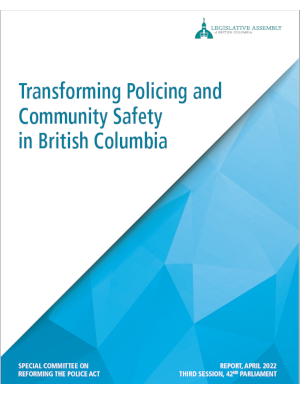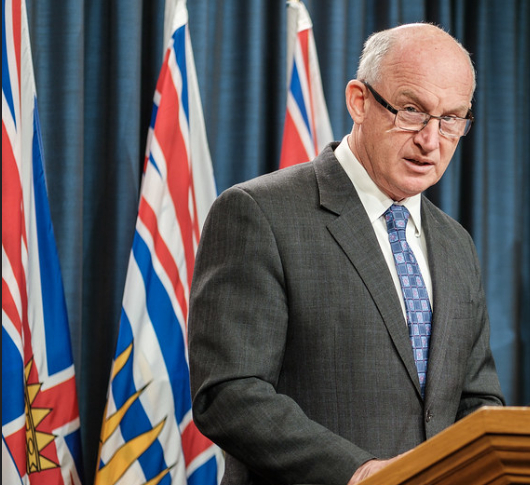Decolonizing corruption
B.C. wants to retain cop cover-ups, but with
native participation under a confused, weird
and racially exclusive Police Act
May 18, 2022
After Vancouver police officer Taylor Robinson shoved a disabled native woman to the sidewalk
for no reason, B.C.’s Office of the Police Complaint Commissioner colluded in a VPD cover-up
that lasted over six weeks, until media found out.
White American poverty pimps Scott Bernstein and Doug King of the Pivot Legal Society
represented the victim. Bernstein kept quiet during the cover-up and King praised
the OPCC’s handling of the case.
Mike Farnworth, in various roles as the relevant opposition critic, an MLA on relevant
legislative committees, and now as Solicitor General, has consistently reneged
on his duty to speak out. He appears determined to entrench a system
that would allow similar cover-ups.
Even after media publicized Robinson’s actions,
no native spokesperson or group took up the issue.
Not just diminished interest, but travel and a malfunctioning computer contributed to this late response to an April 28 report. But yes, diminished interest did play a role. Over the years this project has proved consistently futile, while B.C.’s smugger-than-smug political and legal establishment, along with its poverty pimp aspirants and media courtiers, has proved consistently predictable.
So the “legislative committee” recommendations confirm what’s been apparent for a few years now: B.C. will manipulate identity politics to maintain important aspects of the cop status quo. Specifically, B.C. will further entrench the lack of transparency and accountability that allows cop cover-ups.
As was the case with previous committees and with other B.C. politicians, the report’s author or authors ignored evidence of four cases in which the Office of the Police Complaint Commissioner covered up serious police misconduct. Each case shows a glaring need to bring transparency and accountability to an agency surprisingly shielded from such democratic nuisances.

There’s nothing in these recommendations that would prevent anything similar to the Taylor Robinson cover-up—or the Vinnie Dosanjh, Brent Wray and Frank Elsner cover-ups either, to name just four that have accidentally come to light.
All of them stink, but the Robinson case exudes an especially putrid odour for its contempt towards women, the poor, the disabled and natives.
But even that last detail doesn’t sway Solicitor General Mike Farnworth. He’s strongly implied support for OPCC cover-ups while in opposition and government, in the legislature and on committees much like this one. For all his reconciliation rhetoric, Farnworth—like his Liberal predecessors in the SG ministry—evidently wants to guarantee the possibility of similar cover-ups in the future.
And this does come down to Farnworth. These committees act with such uniform predictability that the MLAs must be taking orders. The incentives are high: The very average people who serve on the committees couldn’t possibly make nearly as much in pay, perks and pensions at a real job. Committee assignments boost their remuneration as well as prospects of promotion.
Moreover, it’s hardly likely the 10-member committee actually wrote the report they signed. The meandering chatter of the committee’s Hansard transcripts suggests these MLAs wouldn’t know how to organize information and express ideas in a lengthy document. It was almost certainly ghostwritten (although often badly) by a government hack. That hack might have worked in consultation with the senior ex-cops in Farnworth’s department, although these recommendations are too confused to suggest a clear-thinking source.
The recommendations evade real transparency and accountability by assigning oversight to natives and other special groups, and then only in cases involving native and other special group victims. Seemingly bludgeoned silly by endless wokery and reconciliation bathos, the report’s author(s) actually called for native children to help oversee investigations into police misconduct.
Most of the report consists of vague, amorphous cause-pleading on behalf of special identity groups, especially natives. There are several calls, imprecise as they are, for special procedures, participation and roles for those groups, again especially natives. But references to transparency and accountability remain nebulous and apply mostly to police, not to those who oversee them. Again, there’s absolutely no recommendation to end the unanswerable, secretive status such as that enjoyed by the OPCC.
The report does recommend replacing the OPCC, as well as B.C.’s Independent Investigations Office and the province’s use of the RCMP Civilian [sic] Review and Complaints Commission, to create a single agency. But there’s no mention of preventing that new agency from inheriting the OPCC’s secrecy and immunity.
Great white benefactor Mike Farnworth seems confident that
those native job set-asides won’t interfere with the cop cover-ups
so important to B.C.’s political, legal and police establishment.
The new agency, BTW, wouldn’t exclude ex-cops or necessarily conduct its own investigations. It would apparently be a three-way mash-up of the current agencies but with lots of natives overseeing the overseers. Exactly how isn’t specified.
The one surprising recommendation (apart from child overseers) is replacing the RCMP. That would end Victoria’s advantage in dumping responsibility for cop imbroglios on Ottawa. Possibly an empire-building mega-project, an entirely new force would open the way to woke-intensive policing that might be amusing to watch, provided you’re not victimized by criminals other than straight white non-junkie guys.
Looking briefly at other issues, not even the actions of seven cops in the fatal Vancouver police shitkicking of Myles Gray convinced the author(s) to call for mandatory body cameras. That leaves nothing to stop another mob of cops from killing someone in private, then evading consequences simply by contradicting each other.
Nor does the report call for an end to cop-on-cop investigations into police sexual misconduct. B.C. and Quebec remain the only provinces that allow this.
There are some serious errors, and not just in English usage. For example the report states, “As a statutory office, the OPCC must regularly report to the Legislative Assembly and respond to questions about their operations….” That’s not true. The OPCC releases an annual report but it outlines only selected cases, in extremely vague terms, with names omitted. The report reveals nothing about the agency’s work, let alone its credibility. The legislature has called the OPCC to account only once, way back in 2002, and those hearings focused on allegations that the police complaint commissioner of the time was bullying his staff.
Another blooper is attributed to a longtime legislature cynic who’s presented as an authority on police matters. “The Hon. Wally Oppal identified [sic] that the Police Act does not provide for independent investigations in the absence of a complaint as a potential gap [sic] for the OPCC.” Apart from the garbled vocabulary and grammar, the statement attributed to Stonewally is factually wrong. Current OPCC head Clayton Pecknold has ordered investigations without receiving complaints.
Whoever wrote the report should know these things.
But, vague as it is, there’s lots and lots of talk about special procedures, special participation and special roles for special groups, especially the most special of all. Here’s a key passage:
5.7 We call upon federal and provincial governments to establish robust and wellfunded Indigenous civilian police oversight bodies (or branches within established reputable civilian oversight bodies within a jurisdiction) in all jurisdictions, which must include representation of Indigenous women, girls, and 2SLGBTQQIA people, inclusive of diverse Indigenous cultural backgrounds, with the power to:
i. Observe and oversee investigations in relation to police negligence or misconduct, including but not limited to rape and other sexual offences.
ii. Observe and oversee investigations of cases involving Indigenous Peoples.
iii. Publicly report on police progress in addressing findings and recommendations at least annually.
9.2 iii Ensure appropriate Indigenous representation, including Indigenous women, girls, and 2SLGBTQQIA people, on police services boards and oversight authorities.
9.6 We call upon all police services to establish an independent, special investigation unit for the investigation of incidents of failures to investigate, police misconduct, and all forms of discriminatory practices and mistreatment of Indigenous Peoples within their police service. This special investigation unit must be transparent in practice and report at least annually to Indigenous communities, leadership, and people in their jurisdiction.
The last sentence states: “must be transparent in practice.” Fleeting, vague and easily ignored as the brief remark is, it could even mean that transparency would be open only to natives, and/or would only apply to cases involving natives.
Considering the extraordinary power bestowed to Canadian aboriginals in other areas, “observe and oversee” might mean another native veto, like that granted to aboriginals over resource and infrastructure projects.
The call for oversight by girls (if that’s what the author(s) really meant) adds another element of unexplained weirdness. Exactly how are children going to oversee investigations?
Come to think of it, they might be harder to buy off. Apart from the unsurprising racial exclusivity of these recommendations (police misconduct towards people outside the most favoured groups isn’t addressed), the report rests on a laughable Rousseauvian pretence—that native participation will improve ethical conduct.
There’ll be lots of new salaried positions for members of special groups, especially natives. The only qualifications seem to be group identity. Yet when has any native spokesperson expressed insight about police accountability, as opposed to cliched grievances?
Does B.C. even have reasonably articulate native spokespeople? You don’t have to endure more than 20 minutes of Grand Chief Stewart Phillip (delivering a “five-minute” speech) to ask this question. PC deference notwithstanding, positive media portrayals fail to inspire confidence in any native leaders.
Do natives ever take up specific cases of police misconduct themselves? Consider the Taylor Robinson assault. No native group addressed this, leaving it to white American poverty pimps Scott Bernstein and Doug King of the Pivot Legal Society to collude in the OPCC/Vancouver police cover-up.
That’s just one example of natives’ reliance on non-native, usually white, grand viziers with their own opportunistic agendas. Non-native, usually white “communications advisors” often direct native bands’ environmental campaigns. The unmarked graves furor was sparked by a white activist and taken up by Canada’s mostly white and entirely non-native media. Over the decades, one native court case after another has been pursued by white lawyers, supported by white historians, anthropologists, archeologists, linguists and others. Natives have been passive bystanders in their rise to the top of Canada’s ethnic hierarchy.
Will that passivity change under a profusion of native-only Police Act jobs? Farnworth might be betting on a caste that’s powerful in theory but ineffectual without outside guidance. Certainly, he seems confident no native will ever ask him why he didn’t speak out on the Taylor Robinson cover-up, or why he so consistently supported Stan Lowe, the OPCC commissioner behind at least four known cover-ups.
All this gives the retirement-ready political fixer a cynical legacy—a police system of fashionable wokery and an assurance that the cover-ups so important to B.C.’s police, political and legal establishment can continue.
Related posts
B.C. Police Act reform:
What MLAs don’t want to know
Another legislative committee will likely evade
the problem of OPCC secrecy and immunity
An open letter to the Union of British Columbia
Indian Chiefs and the B.C. Civil Liberties Association
Police cover-ups are more common than you might realize.
But you’re uniquely positioned to address the problem
The cop status quo matters
B.C. stands ready to manipulate identity politics
to support OPCC corruption
Three principles drive Adam Olsen’s career
He opposes police accountability, sells out natives and
lacks environmental commitment. But the Green MLA
stands firm on his pay, perks and pension
Just following orders
Some reflections on how B.C.’s arrogant but subservient
political culture props up corrupt institutions
The cop status quo stands,
thanks to five self-serving MLAs
Another sham legislative committee entrenches
the OPCC’s lack of transparency and accountability
Read more about B.C.’s sham legislative committees
Read about B.C.’s Office of the Police Complaint Commissioner
Read about B.C.’s Independent Investigations Office
Go to News and Comment page
